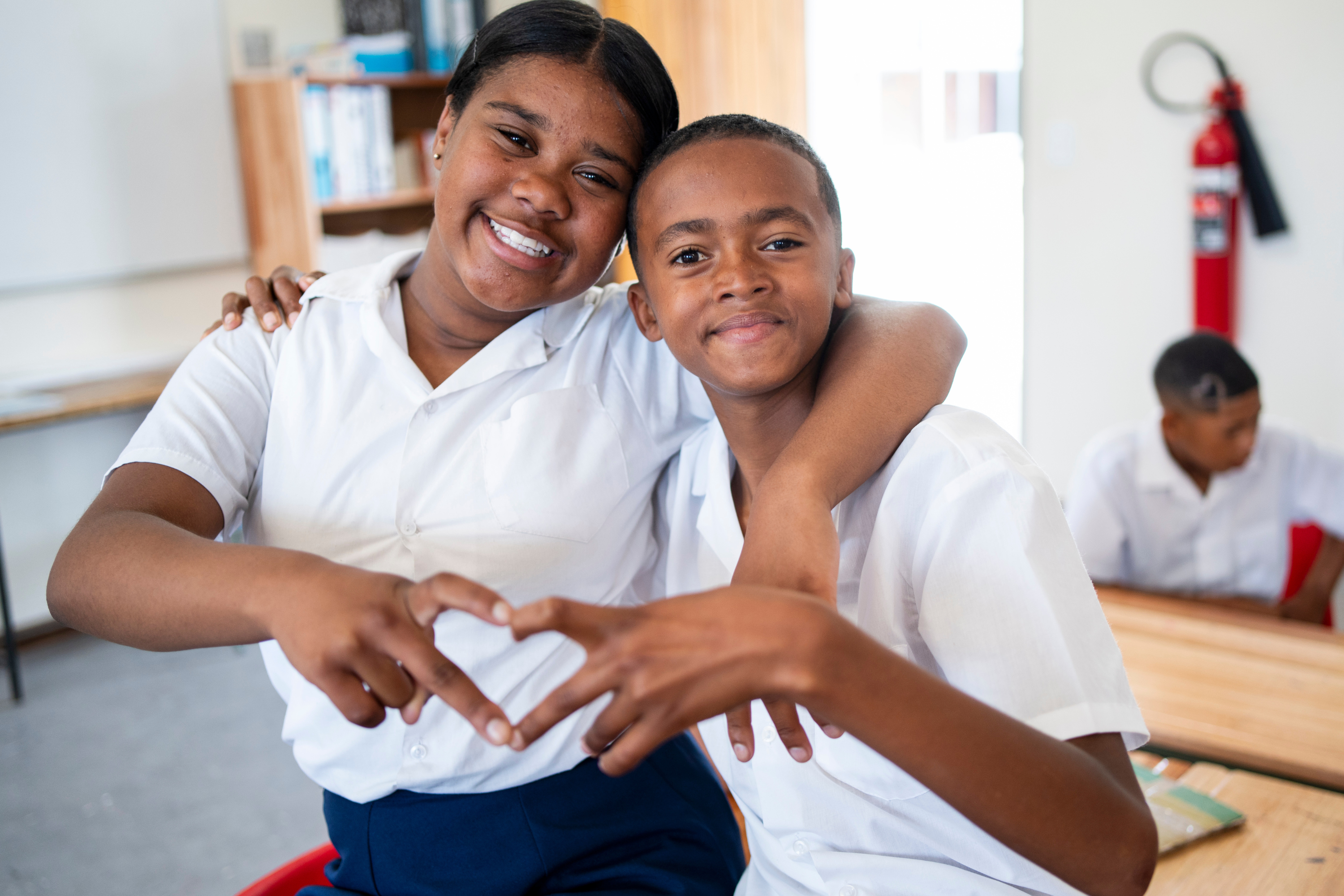8 clever tips to help your tween settle at secondary school, by a child development expert
Teen expert shares how to prepare your tween for the big move to secondary school.


Did you know that the transition from primary to secondary school is a huge major life event for tweens, and one that can impact them for years to come? I'm a teen expert and I'm here to help you with this...
September can be a tricky month with settling the whole family back into a routine - it's made even more intense when bigger changes than usual are happening, such as starting secondary school. It's natural to worry that your child won't settle at school or about school friendships- you're not alone in this, just like your kid isn't when they get the back-to-school anxiety and the 'Sunday scaries'.
Research has indicated that the emotions that tweens (a nickname for ages 8-12 because they are in between children and teenagers) experience when starting high school still affect them at age 18 and a difficult start impacts negatively on their self-esteem, emotional well-being, and academic achievement many years later. As parents and carers, the more that we can do now to help our sons and daughters with this transition the better.
Tweens who have supportive families are more likely to experience an easier, more positive start to school and better resilience to deal with problems that may arise.
How best can you help? As a parent of four young adults and somebody who has written a book that has helped thousands of parents help their tweens with the transition to secondary school I have eight top tips to share with you...
How to settle your tween into secondary school
- Familiarise them with the school
- Familiarise them with the new routine
- Familiarise them with new uniform
- Meet up with classmates
- Get in touch with their form tutor and SENCO if they have any SEND
- Get in touch with their form tutor
- Reset their body clock at least a week in advance
- Embrace emodiversity at home and don’t take their behaviour personally
1. Familiarise them with the school
A lot of anxiety around starting secondary school centres around fears of getting lost, not remembering which class room they should be in, where to find the toilets and where to find the cafeteria. It’s likely your tween has already attended a ‘settling in’ day but see if you can also get hold of a map of the school and play some “can you find the….?” games with your child over the next couple of weeks, so that they begin to know the layout before they start.
Also see if you can find out the names of their teachers, or at the very least their form tutor. Some school websites have photos of staff which can help to familiarise them and finally, see if you can find any photos or videos of the school to share with your tween in advance of them starting.
Parenting advice, hot topics, best buys and family finance tips delivered straight to your inbox.
2. Familiarise them with the new routine
The school day looks very different between junior and secondary school. See if you can find a sample timetable (asking somebody with children already attending) or look on their website to find school day timings. Once your tween knows where they should be at any given time this usually reduces anxiety. Once again, you can play the “it’s …o’clock, where would you normally be at this time?” game with them to help to familiarise them with the new timings.
3. Familiarise them with new uniform
Secondary school uniforms are usually far more formal than those at junior school, involving collared shirts, blazers and sometimes ties. Rather than keeping everything fresh in the packet for the first day, encourage your tween to regularly try on all the clothing so that they feel comfortable with it. Make sure you get plenty of tie-tying practice in and encourage them to wear their new school shoes in, so that they don’t get blisters to add to the mix to contend with on their first day.
4. Meet up with classmates
This is especially important if your tween doesn’t know anybody who will be attending the school, or if you’ve moved from out of area. Most areas will have Facebook groups for new starters, search to find your one and if you can’t consider setting one up and sharing it in a local parenting discussion group.

Maybe somebody will have already arranged a meet-up, if not, suggest one yourself. Having a few known friendly faces can really help your tween to settle in the first few days.
5. Get in touch with their form tutor and SENCO if they have any SEND
If your tween is neurodivergent or has any special educational needs and disabilities, drop an email to their new form tutor and the school SENCO in advance (note – that they probably won’t answer until the end of the summer holidays though) to chat through any needs and adjustments your tween may require and also to ask them for any tips and advice to help them to settle.
If you haven’t already seen it, ask for a copy of their SEND related policies, including their behavioural policy and ask for a discussion in person as soon as school starts if anything in them concerns you.
6. Get in touch with their form tutor
If your child has any medical conditions you will likely have already declared them on the school forms you’ve completed, however it’s always a good idea to drop their form tutor a message and get in touch with the school nurse to talk through any concerns you may have and how they can adapt to suit your child’s medical needs once term starts.
7. Reset their body clock at least a week in advance
Bedtimes usually go out of the window during school summer holidays and most tweens are beginning to experience a ‘circadian shift’ where their body clock changes mean that they naturally begin to wake later. Leaving it until the night before the first day of school to encourage an early bedtime is too late. Instead practice the new school-related sleep and wake timings around a week or so before school starts. This removes the stress of trying to get them up and dressed on time on their first day, which always leaves everybody stressed.
8. Embrace emodiversity at home and don’t take their behaviour personally
In the run up to your tween starting their new school you’ll likely see some shifts in their behaviour. Sometimes they will have more of an ‘attitude’ with increased stroppiness, rudeness and backchat, other times you will find that they will lose control of their temper and their behaviour becomes explosive.
Sometimes they will sulk and withdraw inwards, spending all their time alone in their bedroom. The same is true of the first few weeks and months at school. It can be all too easy to take this behaviour personally and feel that your tween is being deliberately defiant, or rude, but none of this is about you and it’s not something they are consciously controlling.
When tweens struggle their behaviour changes. The best approach here is to resist the temptation to lecture them, punish them or dish out the consequences, instead embrace something known as ‘emodiversity.’
Emodiversity is simply the acceptance of all feelings. Nothing is good or bad and an individual is not deemed to be unlikeable, or impolite because they are angry or similar. Let your tween know that your home is a safe place for them to let all their feelings out and don’t read things into their words that just don’t exist. Remember, you are the adult here, it’s your job to stay calm and emotionally regulated in order to help your tween to regulate their emotions too.
What would have helped teenage you starting a new school?
Think back to when you were 11 years old: it's your first day at your new school, is there anything, any practical tips, or any emotional support, that your parents could have given you that would have made things easier for you?
Maybe nothing comes to mind immediately but keep coming back to this question on the run up to the 'firt day back' and jot down anything that you think of. The chances are if it would have helped you, it will help your tween too. I think too often we forget our own childhood experiences and we don’t use them enough to help guide us with our own children, but these memories and experiences are powerful guides if we use them.
Talking openly about and sharing your own emotions is a good place to end, since it isn’t only your tween who may struggle with the transition. Your ‘baby’ starting ‘big school’ is a tremendous transition for you too and is likely to throw up all sorts of conflicting emotions. Just as you should embrace emodiversity with your tween, you should also allow yourself time and space to feel all of the feels too. It’s OK to have a cry the night before, or the morning of them leaving for their first day, in fact it’s incredibly cathartic, just try to portray an aura of calm and happiness until you’ve waved them off.
Sarah is one of our GoodtoKnow experts, a mum-of-four and author or many a child development book, including tweens and teens, she creates engaging, relatable and helpful teen content such as busting the myth that 'teenagers are lazy' will make you feel relief, and tips to get your teen to revise will make you realise it's not just you. Plus her insight into why teenagers never leave their room is hugely relatable - send to anyone in your life with a teen.

Sarah Ockwell-Smith is a mother of four young adults. She has a background in Psychology and clinical research and has also worked as an antenatal teacher and doula. Sarah has written fifteen childcare books, covering everything from newborns to teenagers, with a special emphasis on ‘gentle parenting’. Sarah regularly contributes to National TV and radio, including Good Morning Britain and BBC Radio 4 and 5, she has also written for national publications including The Guardian, The Express, The Daily Mail, The IPaper and The HuffPost. Sarah lives with her family, two rescue dogs, cats and chickens in North Essex. Sarah's newest book How to raise a teen is due to hit shelves July 4th 2024.